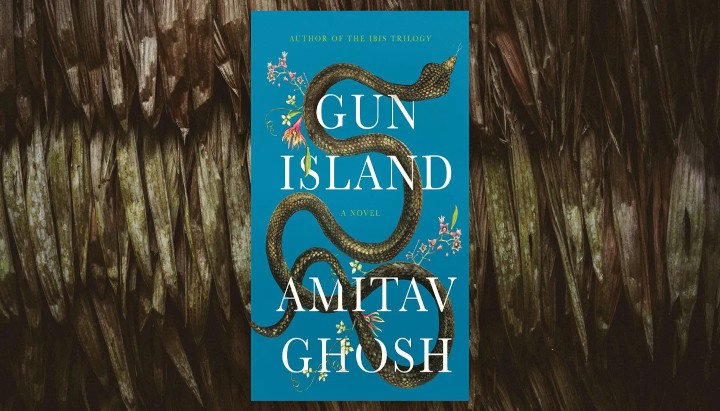
লিট ইনসাইড
A Critical Review of 'Gun Island'
প্রকাশ: 05/08/2022

Gun Island by Amitav Ghosh, is a novel of migration and journey, mixed with myth and folklore, and set against the backdrop of climate change's increasing catastrophe. It features a complex narrative that blends human and animal characters, past and present, and natural and supernatural elements. Gun Island uses the myth of the ‘Gun Merchant’ as a connection to drawing parallels between the Little Ice Age and our current situation, where droughts, floods, cyclones, wildfires, and epidemics have become a part of our daily lives. According to Gun Island these unprecedented meteorological conditions, are the major cause of these catastrophic calamities. It effectively depicts people and entire communities being dislocated from their original country, as well as substantial changes in the migratory patterns of many species, making it a clarion call for climate-induced migrations.
Gun Island is kind of a novel that deals with the idea of ecocriticism, an interdisciplinary movement that aroused in the 1970s which explores the damages inflicted on the environment by human activities. Climate change is one of the most important topics at this moment, and Amitav Ghosh’s Gun Island is one of the best climate fiction in this genre. Climate fiction is concerned with the symbols, narratives, and concepts that are used to symbolize and provide meaning to climate change in our society: Environmental changes are conceived in these literary works through apocalyptic viewpoints that highlight catastrophic natural events such as floods, fires, and storms. Simultaneously, climate fiction books focus on political and social failings in addressing climate change by incorporating them into a new narrative that portrays the current situation as tangible and concrete rather than incomprehensible and impossible, as policymakers often portray it.
The most prominent aspect of Gun Island is the unification of history, culture, and nature. The story follows Deen Datta, an antique book dealer who was born in Bengal but now lives and works in New York. Deen visits a cousin on one of his journeys back home who tests his knowledge of Bengali and Indian mythology by telling him the narrative of “Bonduki Sadagar”, the Gun Merchant. Deen goes to a dhaam, a temple created for a god, in the Sundarbans, a mangrove region in the Bay of Bengal, to better comprehend the story. He reveals the entire story of the Gun Merchant, who had to sail across countries and seas to escape the Goddess Manasa Devi, goddess of snakes and all venomous creatures, who was punishing him. Deen's personal experience begins in the Sundarbans, where he is joined by marine biologist Piya, youngsters Tipu and Rafi, and subsequently by his academic adviser Cinta, an Italian professor, on a journey that would take him from India to Los Angeles and Venice. This expedition challenges Deen's sense of rationality while it sheds light on the implications of capitalism for environmental change.
As apocalyptic narratives are commonly used in climate fiction to make the horrors and urgency of environmental change more apparent to the reader. This aspect is evident in Gun Island, as Ghosh briefly discusses the cyclone ‘Aila’ of 2009 when Deen is in the Sundarbans; the author explains how the harm caused by this climatic disaster was compounded by human behavior, leading to significant societal change in the area. Moreover, Deen's trip to Los Angeles and Venice is defined by climatic changes: Los Angeles is on fire, with massive flames dangerously lighting the city's outskirts, while Venice is sinking, with the canal's water dangerously rising. Furthermore, Ghosh depicts the impact of global ecological chaos by pointing out changes in the distribution patterns of various overland and oceanic animal species. Piya is concerned about the habits of the dolphins she studies, and her concern grows when Deen tells her about a venomous snake he discovered in Los Angeles' ocean and the non-native venomous spider he encounters in Venice while staying at Cinta's house. Indeed, increasing temperatures and ecological destruction have prompted some species to move north. People are forced to migrate because of the interconnected chain of colonial history, climate change, and ubiquitous capitalism, which also forces animals to migrate.
Tipu and Rafi's experience is similar to that of many migrants, they are prepared to sacrifice everything for a chance at a better life, even if it means going on a risky voyage in which they would be subjected to harsh and cruel treatment. Furthermore, when migrants get to their final destination, they may face further difficulties. Illegal immigrants are frequently rejected and left alone on a boat in the middle of the sea, waiting for rescue and hospitality that European governments would not offer.
Finally, this apocalyptic story serves as a backdrop for Ghosh's principal theme in the novel, the need to rediscover a feeling of common humanity to create a society that is trans-species in nature, breadth, and legacy, extending beyond the brotherly human-to-human tie. Only through caring for and loving other people, he says, will mankind be able to care for and love Mother Earth once more. The vastness of the crises and their effects shown by Ghosh in Gun Island allows for cross-society and cross-species collaborations. Ghosh develops a tale that situates its protagonists inside networks that encourage reciprocal knowledge and enable cooperative acts, touching on subjects such as xenophobia, immigration, climate change, and environmental damage.
Arunav Das; Independent Filmmaker, Writer, and Translator
প্রধান সম্পাদকঃ সৈয়দ বোরহান কবীর
ক্রিয়েটিভ মিডিয়া লিমিটেডের অঙ্গ প্রতিষ্ঠান
বার্তা এবং বাণিজ্যিক কার্যালয়ঃ ২/৩ , ব্লক - ডি , লালমাটিয়া , ঢাকা -১২০৭
নিবন্ধিত ঠিকানাঃ বাড়ি# ৪৩ (লেভেল-৫) , রোড#১৬ নতুন (পুরাতন ২৭) , ধানমন্ডি , ঢাকা- ১২০৯
ফোনঃ +৮৮-০২৯১২৩৬৭৭